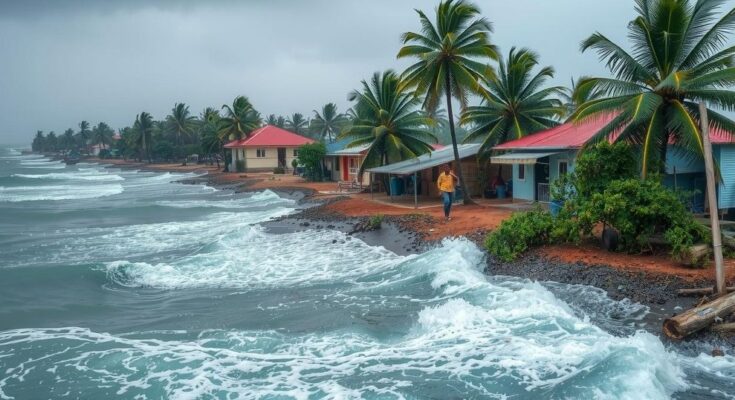Tropical Cyclone Chido devastated Mozambique, impacting over 453,971 individuals and leaving significant infrastructure damage. Urgent humanitarian needs are rising due to casualties and a cholera outbreak amidst existing crises. The response requires additional funding and resources to support affected populations and address vital health and safety concerns.
The destruction wrought by Tropical Cyclone Chido in Mozambique has necessitated urgent humanitarian action due to the dire plight of affected communities. Making landfall on December 15, 2024, the cyclone unleashed torrential rains exceeding 250 mm and winds up to 120 km/h. By December 24, reports indicated that approximately 453,971 individuals were impacted, with significant infrastructural damage including the destruction of over 70,000 homes, 250 schools, and critical health centers. Amid ongoing assessments, the humanitarian situation remains grave, further compounded by a cholera outbreak in affected regions.
In Cabo Delgado Province, estimates suggest that 272,000 individuals were severely affected. Communities in districts such as Mecufi and Metuge saw near-total destruction of homes. Many residents, already living in precarious conditions, were stripped of their shelters and basic services. Nampula Province faced similar devastation, with at least 175,169 people affected and roads compromised, complicating both evacuations and essential supply deliveries.
The inherent vulnerabilities of the displaced populations are alarming; many are in makeshift shelters and lack access to vital resources. The cyclone’s aftermath has also led to a worrying rise in protection concerns, including the risk of gender-based violence. With families separated and documentation lost, effective mental health and psychosocial support is necessary to address these challenges.
As humanitarian efforts continue, agencies are racing against time to provide essential relief and restore basic services. However, the scale of needs currently exceeds the available resources. Additional funding is crucial to ensure the ongoing response is effective and sustainable, as Mozambique also grapples with the impacts of drought, conflict, and health crises. Immediate interventions must include the provision of food, clean water, medical supplies, and support for damaged infrastructure.\
In recognition of the complexities, authorities and humanitarian partners are working collaboratively to deliver assistance amid a precarious operating environment, while prioritizing protections for vulnerable populations. The urgency to support these communities cannot be overstated; immediate action is paramount to prevent further deterioration and assist recovery in the affected provinces.
Tropical Cyclone Chido struck Mozambique on December 15, 2024, causing widespread devastation across multiple provinces. The cyclone highlighted the vulnerabilities faced by communities already coping with compounded crises such as conflict and drought. Local authorities, alongside national and international humanitarian partners, are mobilizing resources to address the emergency needs arising from the cyclone. This situation is exacerbated by pre-existing health concerns, particularly a choleral outbreak in Nampula Province and the impact of displacement on local populations. The urgency to respond to this disaster reflects a critical intersection of humanitarian, health, and developmental issues requiring immediate and coordinated action.
In conclusion, Tropical Cyclone Chido has inflicted unparalleled damage on Mozambique, necessitating urgent humanitarian assistance for thousands of affected individuals. With the immediate needs outpacing the available response capacity, additional resources must be mobilized to address the humanitarian crisis and assist in recovery efforts. Protection and health concerns intensify the urgency to provide targeted support to vulnerable populations affected by both the cyclone and previous crises. Collaborative efforts and additional funding are vital for sustaining effective humanitarian action and ensuring the resilience of impacted communities in the face of ongoing challenges.
Original Source: reliefweb.int




